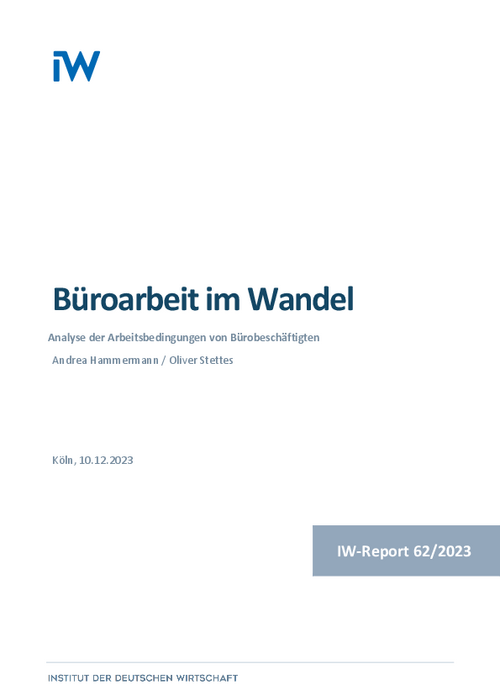Office work has changed considerably over time and reflects both technical progress and the zeitgeist of the decades.

Office work in transition: Analysis of the working conditions of office workers

Office work has changed considerably over time and reflects both technical progress and the zeitgeist of the decades.
Office work accounts for a large share of employment in Germany.
- More than one in two (55 percent) say they work mainly in an office.
- The share of office jobs is particularly high in financial services, housing and information and communication technology and media. The lowest proportion is in trade, transport, and hospitali-ty and in craft enterprises.
Office work offers great flexibility in terms of work location and working hours. However, most of them work at fixed workplace and are oblidged to attend on site.
- Office workers can work remote and under flexible working arrangement more often. However, around 54 percent are nevertheless usually tied to being present in the company or to another job-related location due to their work tasks.
- Around 79 percent employees work predominantly at a permanently assigned workplace in their company.
Many companies do not formally lay down rules on remote working.
- Working from home is possible in around 69 percent of all companies. Around 15 percent of com-panies also offer opportunities to work abroad.
- Every third company in which remote working is possible has a formal regulation on this, for ex-ample in the form of a company agreement on remote working or a corresponding paragraph in the work and social regulations.
Office workers have a predominantly positive perception of their everyday working life, but more often perceive inequalities in access to the telework as unfair.
- Office workers are more often satisfied with their work and perceive the compatibility of family and work more positively than other employees.
- The fact that access to family-friendly measures is not the same for everyone can lead to tensions in the workforce. However, only a smaller proportion of companies (around 16 percent) have no-ticed this increasing in recent years.
- However, office workers who do not (cannot) work remote perceive the unequal access oppor-tunities to telework as unfair significantly more often than other employee groups.

Office work in transition: Analysis of the working conditions of office workers

More on the topic

Determinants of personnel planning in Germany
The German labor market has been growing since 2005. The dip in the wake of the coronavirus pandemic between 2020 and 2022 is an exception, as the German labor market has reached a record level of 45.9 million people in employment by 2023.
IW
What factors influence the career ambitions of people with disabilities?
Many companies in Germany report having difficulties not only in recruiting employees, but also in filling vacant management positions.
IW